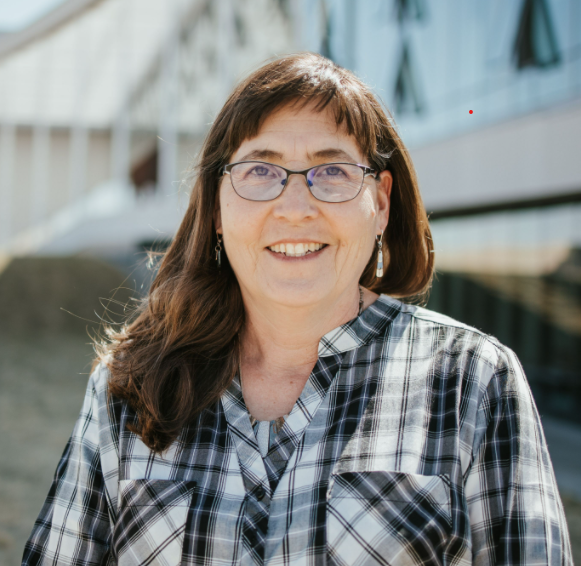To continue with our agriculture research theme for the summer, we spoke with Dr. Michele Konschuh. She’s an irrigated crop scientist at the University of Lethbridge – which is incredibly timely as our next Agri-Food Summer Series talk is focusing on modern crop production challenges and solutions. If you like this, make sure you register for the next Agri-Food event on July 27th!

Hi Michele, thanks for taking the time to speak with us today. What kind of projects does an irrigated crop scientist get to work on?
I am working with colleagues from Agriculture and Agri-Food Canada on potential ways to reduce blackleg disease in potato crops. The project is just at the beginning. We plan to collect samples from producers and agronomists to characterize the causal organisms and to isolate bacteriophage associated with them. We also want to work on better tools for in-field identification of the disease. We want to explore biocontrol mechanisms to reduce the disease as well as some in-field approaches.
Another potato project I’m working on is with the Lethbridge College and Alberta Agriculture to coordinate regional potato variety evaluations trials in Alberta. We have almost 100 potato varieties in trials in Brooks. This data helps producers and agribusinesses select varieties with better nitrogen use efficiency and disease resistance while maintaining productivity and quality.
I am also working with UBC professors and Farming Smarter on a project aimed at automating some of the irrigation management decision making that producers face. This project will help people achieve the full potential of the variable rate irrigation systems they have and will improve water use efficiency while reducing water needed for irrigation.
Over the winter, I worked with a recent graduate from University of Lethbridge on a project reviewing water use efficiency and nutrient use efficiency in Canola. The project was commissioned by the Canola Council of Canada and may help to direct future research on the topic. I also plan to work with a special projects company based in Alberta to explore the potential for upland rice production for value added processing opportunities. This work is in its infancy here.
What excites you the most about this work?
It gets me excited when I have the opportunity to work on projects with the potential to help producers and agri-businesses in the near future. We work with some very progressive people in the agricultural industry, and they deserve to have good information on which to base business decisions. Researchers have a role as liaison officers to bring science solutions to people who need them.
I am also very much looking forward to teaching a graduate-level course on Sustainable Agriculture in Fall 2021 at a time when so many producers and businesses are embracing strategies in this area. This course will serve as an introduction to the topic of sustainable agriculture especially for students pursuing research in this area. I plan to bring in speakers from other research organizations and local businesses to showcase the positive work being done in this area.
I want to take a moment to acknowledge the McCain Foundation, as they are the driving force behind the Sustainable Agriculture course and also sponsored 6 graduate scholarships at uLethbridge!
You have already partnered with many people in industry and academia on your projects...but if you had the chance is there anyone you would like to work with in the future?
Ideally, I would work with a broad range of agri-businesses in and around Alberta. Currently we work with Lamb Weston, Old Dutch Foods, Cavendish Farms, Edmonton Potato Growers, Tuberosum Technologies and the Potato Growers of Alberta on variety evaluations - and Ensemble Scientific and LiteFarm are partnering with us on the irrigation automation project.
Is there something in particular that attracted you to do research at uLethbridge?
The University of Lethbridge is located in one of the most productive agricultural areas of the province. There are many research questions and potential collaborators in this area that will ensure I never run out of projects or ideas. I feel that we are well-positioned to coordinate and conduct research to help the agricultural industry move forward.
Tell us one fun fact about you!
We recently lost a dog that the whole family loved. Although we would love another dog, our lives are quite busy and unpredictable right now. So, my son brought home a bearded dragon last year. Sumo is a surprisingly interesting pet and keeps us company while working/studying from home.

Would you like to connect with Michele? You can find her on LinkedIn, or get nitty-gritty with her publications on ResearchGate.
As always, follow ORIS on LinkedIn & Twitter to get the latest research story, and updates on our Agri-Food Summer Speaker Series!